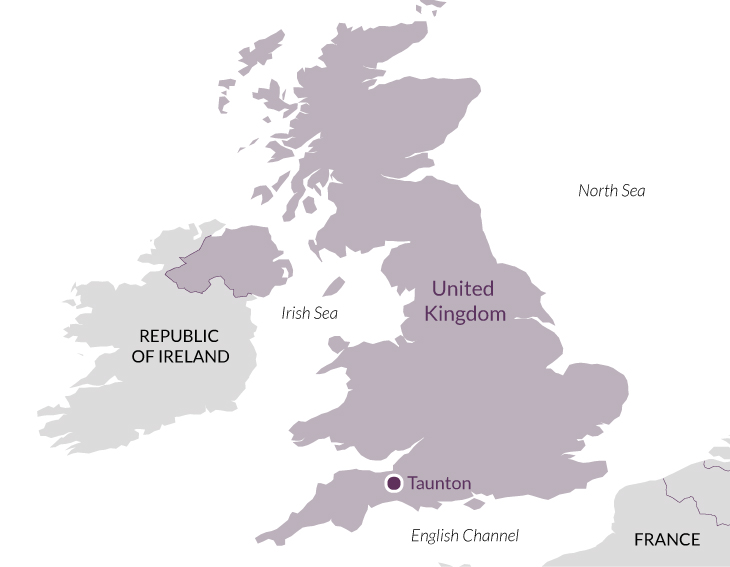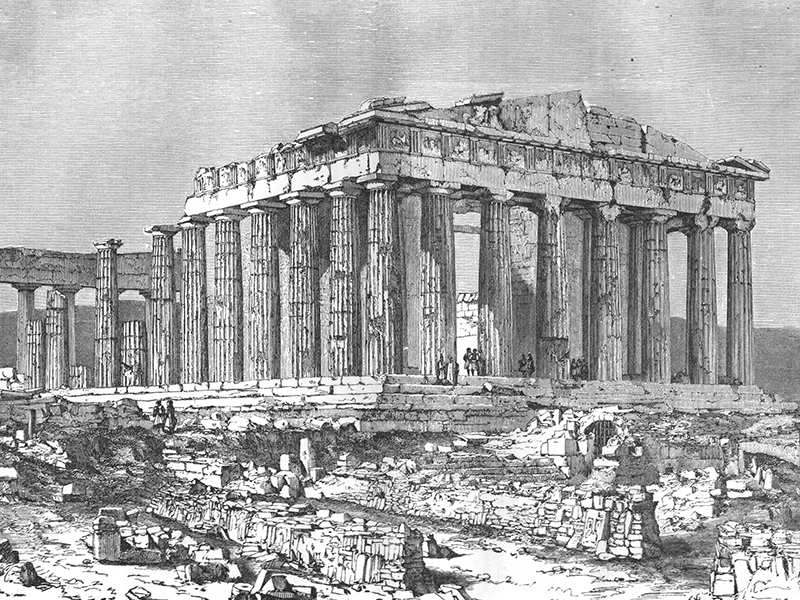Overview
The latest in our highly successful series of symposia, this residential event will explore the history and culture of ancient Greece. In a programme that aims both to inform and entertain, top historians will give talks on such themes as democracy, citizenship, warfare, technology, myth, religion, art, sex and crime. They promise to introduce fresh ideas and new thinking, adding colour, breadth, insight and detail to our understanding of Greek civilisation.
The excellent Castle Hotel, Taunton, is our host. Renowned for its service, comforts and superb catering, it has been owned and run by the Chapman family for over 60 years. The symposium takes place in the Music Room.
Our speakers are: Professor Paul Cartledge, Professor Tony Freeth, Professor Edith Hall, Professor Lloyd Llewellyn-Jones, Professor Tony Spawforth, Professor Emma Stafford, Professor James Robson and Dr Alexandra Villing.
Speakers
Professor Paul Cartledge. A.G. Leventis Senior Research Fellow of Clare College, Cambridge, and Emeritus A.G. Leventis Professor of Greek Culture in the Faculty of Classics, University of Cambridge. He is an Honorary Citizen of (modern) Sparta and holds the Gold Cross of the Order of Honour awarded by the President of the Hellenic Republic.
Professor Tony Freeth. Honorary Professor in the Dept of Mechanical Engineering, University College London. A founder member of the Antikythera Mechanism Research Project, in 2000, he proposed and organised new scientific investigations on the Mechanism. The results revolutionised Antikythera research.
Professor Edith Hall. Professor in the Department of Classics and Ancient History at Durham University. A specialist in ancient Greek literature, she is also a world-renowned scholar of ethnicity, class and gender in ancient sources, of ancient theatre, and of the instrumentality of ancient ideas in world culture since the Renaissance.
Professor Lloyd Llewellyn-Jones. Holds the Chair in Ancient History at Cardiff University. He is best known for his work in the fields of Ancient History and Persian Studies. He is co-editor of Greek Notions of the Past in the Archaic and Classical Eras and The Hellenistic Court; co-author of The Greeks at War and author of Designs on the Past: How Hollywood Created the Ancient World among other books.
Professor James Robson. Professor of Classical Studies at the Open University, where his teaching encompasses Greek and Latin language and the literature and social history of Classical Athens, with a particular focus on comedy, myth, humour and sex. His publications include Aristophanes: An Introduction and Sex and Sexuality in Classical Athens.
Professor Tony Spawforth. Emeritus Professor of Ancient History at Newcastle University. A historian and broadcaster specialising in Greek and Roman antiquity and in rulers’ courts. In 2018, he published The Story of Greece and Rome. Other books include The Complete Greek Temples and Greece: An Oxford Archaeological Guide.
Professor Emma Stafford. Professor of Greek Culture at the University of Leeds. She is author of numerous works on Greek myth, religion and iconography, and coordinator of The Hercules Project: a Hero for all Ages (www.herculesproject.leeds.ac.uk), and co-editor of the project’s four volumes on post-Classical receptions of Herakles.
Dr Alexandra Villing. Curator of the Greek collections in the British Museum’s Department of Greece and Rome, where she recently co-curated the exhibition ‘Troy: Myth and Reality’. Her research focuses on the interaction between Greece and neighbouring cultures in the first millennium BC, on which she has published widely. She has previously excavated in western Turkey and currently directs a major research and fieldwork project on the Egyptian-Greek trading port of Naukratis in the Nile Delta.
Talks
Sparta: How Odd? Professor Paul Cartledge
There were about a thousand ancient Greek ‘cities’ of which Sparta was certainly one of the most powerful and influential. But how different – or indeed odd – was it really?
Thebes: the Forgotten City of Ancient Greece. Professor Paul Cartledge
Why ‘forgotten’? How should it best be remembered? There will be a focus on Thebes’ glory days in the 4th century BCE, the era of statesman-general-philosopher Epameinondas.
The Astonishing Antikythera Mechanism. Professor Tony Freeth
From its discovery in 1901 by Greek sponge divers, the Antikythera Mechanism, an ancient Greek hand-powered orrery used to predict astronomical positions and eclipses, has astonished scientists as its structure has been unravelled over a 120-year research history.
The Greeks and the Sea. Professor Edith Hall
The sea permeated every dimension of Greek life and thought. This talk explains how sea travel is the ‘missing link’ in accounts of the ancient Greeks’ achievement.
Women and Religion in the Classical Polis. Professor Edith Hall
Historians tend to stress the exclusion of ancient Greek women from civic life. They could not vote, enter politics or litigate. But in the sphere of religion they enjoyed status and freedoms almost unimaginable to modern monotheism.
The Eurymedon Vase: a Trophy of the Persian Wars. Professor Lloyd Llewellyn-Jones
The imagery of Greek-Persian sexual interaction on the Eurymedon Vase (c. 460 BCE) has been seen as a metaphor for the Greek defeat of Persia at the battle of Eurymedon. How did the original viewers see it?
‘This season I shall mostly be wearing purple’: clothes and colour in Ancient Greece. Professor Lloyd Llewellyn-Jones
One of the great misconceptions about Greek life is that clothes were white and simple. In fact, clothing was both colourful and complex and it projected multiple messages by the wearer and for the viewer. This talk explores the rich dress codes of the ancient Greeks and analyses the way clothes were worn and the social messages encoded in them.
Beauty, sex and desire in Classical Athens. Professor James Robson
The art and literature of Classical Athens provide rich avenues in which to explore its complex relationship with sex and attraction, from erotic vase painting, to more muted references to physical characteristics and seductive behaviour.
Smoke and Mirrors: in search of the historical Alexander. Professor Tony Spawforth
The young Alexander’s invasion of the Persian empire in 334 BCE has left few physical remains. For reconstructing this pivotal moment in world history we rely instead on Classical writings.
When Rome came marching in, or Ancient Greece Under the Boot. Professor Tony Spawforth
During the 100s BCE Roman aggressions in the eastern Mediterranean included the military conquest of Macedonia and Greece. The defeated Greeks endured mass deportations, razed cities, the suppression of democracy and more. Under the Pax Romana they then experienced a cultural revival, based on a nostalgia for the Classical Greek past.
Heraklean identities: myth and the polis. Professor Emma Stafford
Best known as the monster-slaying hero of myth, Herakles has a number of important roles in Greek history. This talk examines his functions as ancestor of kings, founder of cities, and patron deity of communities – all of whose identities he helped to articulate.
Greeks in Egypt, new discoveries. Dr Alexandra Villing
For a long time much of what Greeks knew of Egypt was hearsay or mythical tales of fabulous wealth, powerful magic and murderous kings. All this changed in the 7th century BC when a new Egyptian dynasty in need of allies invited Greek and other foreign mercenaries and traders into the Nile Delta. The ensuing exchange shaped both cultures. The trading port of Naukratis, the earliest Greek settlement in Egypt, was a key hub in this interaction, long before the foundation of Alexandria. Ongoing research conducted by the British Museum since 2011 is shedding new light on the lives of Greeks in Egypt.
Session 1
Wednesday 12 October: 3.15–6.00pm
Professor Lloyd Llewellyn-Jones: ‘This season I shall mostly be wearing purple’: Clothes and Colour in Ancient Greece.
Professor Paul Cartledge (Professor Cartledge is unable to attend in person and will deliver his talks via zoom): Thebes: the forgotten city of Ancient Greece.
Refreshment break. Tea and coffee are served in the foyer on the ground floor.
Professor Paul Cartledge: Sparta: How odd?
Session 2
Thursday 13 October: 9.45am–12.30pm
Professor Edith Hall (Professor Hall is unable to attend in person and her talks will be pre-recorded): The Ancient Greeks and the Sea.
Professor Tony Freeth: The Astonishing Antikythera Mechanism.
Refreshment break. Tea and coffee are served in the foyer on the ground floor.
Professor Lloyd Llewellyn-Jones: The Eurymedon Vase: a trophy of the Persian Wars.
Session 3
Thursday 13 October: 3.15pm–6.00pm
Professor Tony Spawforth: Smoke and Mirrors: In search of the historical Alexander.
Professor James Robson: Beauty, sex and desire in Classical Athens.
Refreshment break. Tea and coffee are served in the foyer.
Professor Emma Stafford: Heraklean identities: Myth and the poli.
Session 4
Friday 14 October: 9.45am–12.30pm
Professor Edith Hall: Women and Religion in the Classical Polis (Professor Hall is unable to attend in person and her talks will be pre-recorded).
Prices, per person
Two sharing: standard double or twin £840; garden room £990.
Single occupancy: single room (single bed) £840; double for single occupancy £910.
Included
Hotel accommodation for 2 nights; breakfasts and 2 dinners with wine; admission to the talks; drinks reception; refreshments during breaks; gratuities for hotel staff.
Accommodation
The Castle Hotel, Taunton: the hotel’s bedrooms are individually and charmingly decorated. Doubles and twins are mainly of a good size, and the largest – Garden Rooms – overlook the garden. The majority have a bath with a shower fitment (only four have a walk-in shower, so please request when you book if you require one of these). There is no single-occupancy supplement for rooms with single beds.
The hotel has a lift, though some bedrooms do then involve some step access. There are no bedrooms on the ground floor. The Music Room is on a mezzanine level, which can only be reached via a flight of stairs from the lobby.
Taunton lies on the doorstep of Exmoor and the Quantocks, areas with some of the loveliest countryside in England.
Group size
Maximum 68 resident participants.
Talks only
To attend the talks alone, the price is £60 per session (discount of £40 to attend all four). Please call us to book on 020 8742 3355.

'The lecturers were outstanding – well-informed and engaging delivery.'
'This is the best Martin Randall event I have ever been on. The programme, lecturers and audio visual provision was exemplary; whoever devised the weekend and chose the speakers should be congratulated!'
'Congratulations to all for organising such a stimulating weekend. A taste of academic life again!'
'I thought the weekend was excellent... I was engrossed by the lecturers, which were very accessible and entertaining.'
